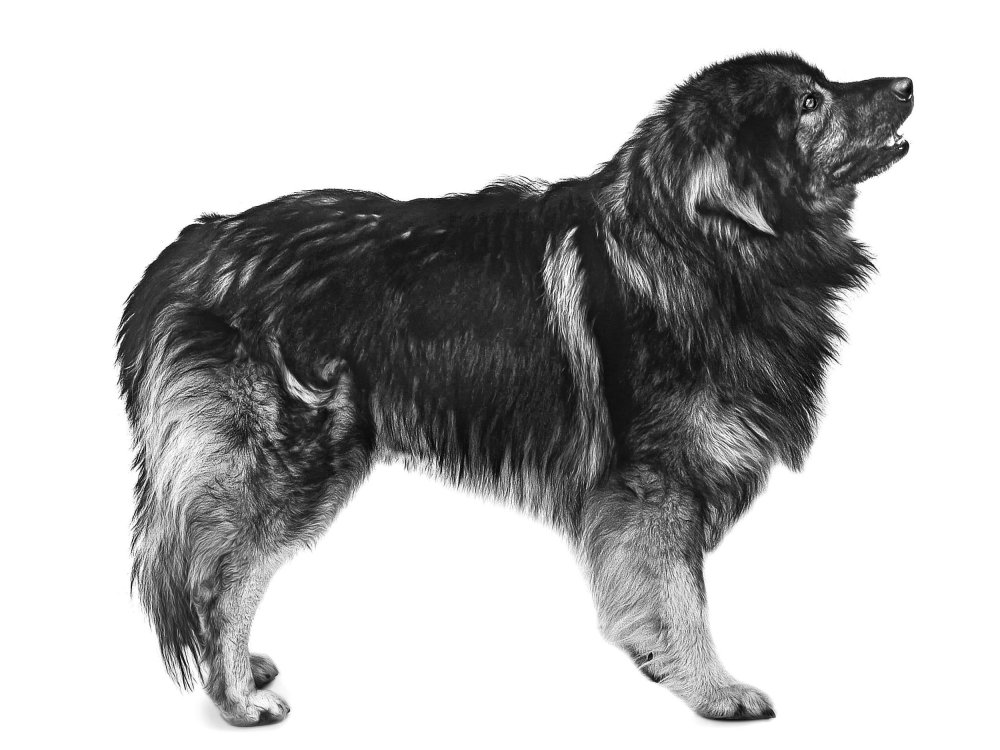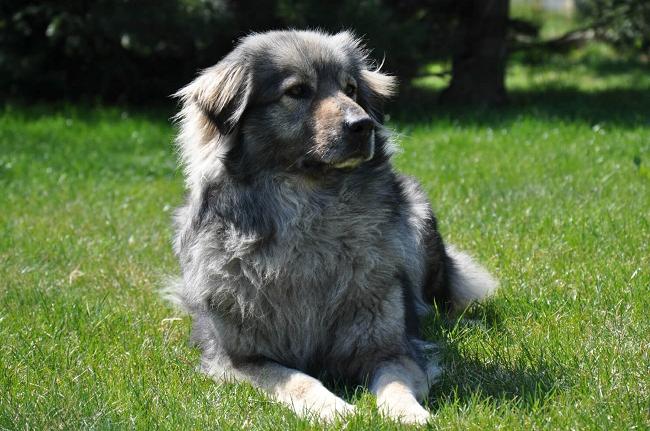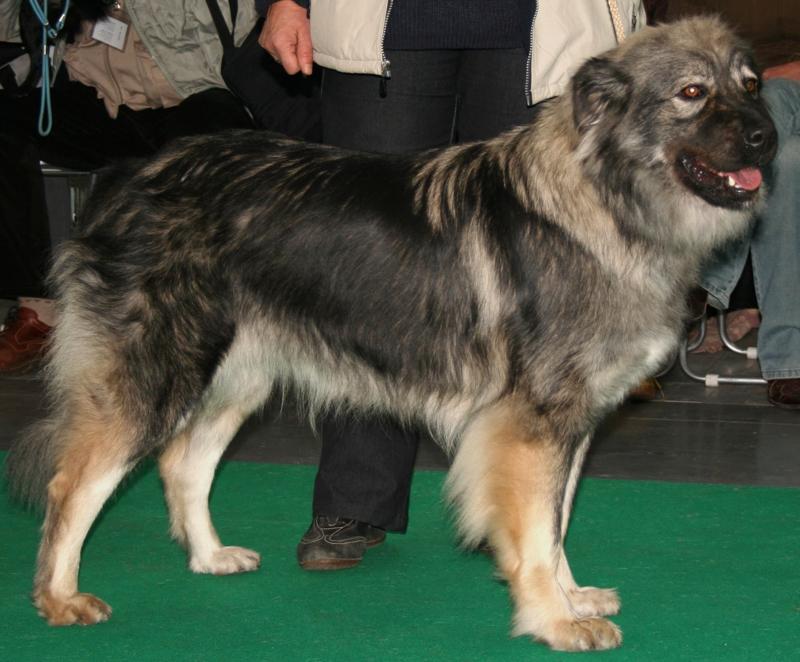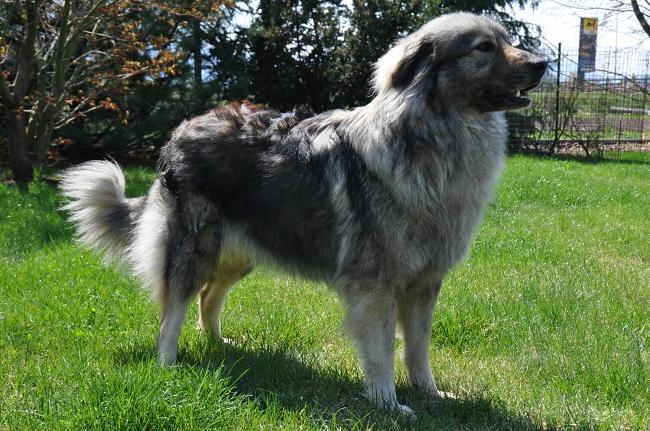- Breed Category: Working dog
- Country of Origin: Slovenia
- Average Height: Males 57-63 cm, Females 54-60 cm
- Average Weight: Males 30-42 kg, Females 25-37 kg
- Average Life Span: 10-12 years
- Grooming Requirements: Moderate, regular brushing needed
- Exercise Requirements: High, needs daily exercise
- Coat Type: Dense, double coat
- Coat Color Variations: Grey with darker shades
- Shedding Level: Moderate to high
- Ear Type: Medium, triangular, hanging
- Tail Type: Long, bushy, carried low
- Temperament: Loyal, protective, calm
- Intelligence Level: High
- Barking Tendency: Moderate
- Compatibility with Children: Good with proper socialisation
- Compatibility with Other Pets: Generally good with socialisation
- Training Ease: Moderate, requires consistent training
- Common Health Issues: Hip dysplasia, eye issues
- Dietary Needs: High-quality, balanced diet
- Energy Level: High
- Drooling Tendency: Low
- Sensitivity to Weather: Tolerant to cold, less to heat
- Overall Maintenance Level: Moderate
- Original Purpose: Herding and guarding livestock
- Year of Recognition by Kennel Clubs: 1939
- Apartment Friendly: Not ideal, needs space
- Best Suited For: Active families, rural settings
- Cost of Ownership: Moderate to high
- Unique Traits: Strong guarding instincts
Imagine a dog that embodies both strength and loyalty, a true guardian of the home. The Karst Shepherd Dog, with its striking appearance and protective nature, is a breed that stands out. Originating from the picturesque Karst region of Slovenia, this breed has a rich history intertwined with the rugged landscapes it once roamed. Known for its intelligence and calm demeanor, the Karst Shepherd is not just a working dog but a devoted family companion. This article aims to delve into the unique characteristics, fascinating history, and essential care tips for this remarkable breed. Understanding the Karst Shepherd’s background and needs will help you appreciate why it has been cherished for generations.
Early Development and Role in Slovenian Shepherding

Early Development of the Breed
The Karst Shepherd Dog has roots that stretch back centuries, evolving in the rugged terrains of Slovenia. This breed was shaped by the harsh environment, developing traits that made it resilient and adaptable. Over time, selective breeding honed its natural instincts, creating a dog that was both a protector and a worker.
Role in Slovenian Shepherding and Livestock Protection
In the heart of Slovenia, the Karst Shepherd played a crucial role in shepherding. These dogs were indispensable to farmers, guarding livestock against predators and ensuring the safety of the flock. Their keen senses and unwavering loyalty made them perfect for this demanding job. Even today, their protective nature is highly valued in rural communities.
Key Historical Figures and Regions
The breed’s development is closely linked to the Karst region, a place known for its unique landscape and cultural heritage. Local shepherds and breeders were instrumental in refining the breed, ensuring it met the needs of the community. Their dedication has preserved the Karst Shepherd’s legacy, making it a symbol of Slovenian pride.
Physical Characteristics
With a robust build and a thick, weather-resistant coat, the Karst Shepherd is well-equipped for outdoor life. Its strong frame and agile movements reflect its working heritage. The breed’s expressive eyes and alert ears give it an intelligent and attentive appearance, while its calm demeanour makes it approachable and friendly.
Appearance and Unique Traits

Appearance
The Karst Shepherd is a medium to large-sized dog, with a sturdy and muscular build that speaks to its working roots. Its coat is dense and weather-resistant, typically a mix of grey shades that blend seamlessly with the natural landscapes of its homeland. Distinctive markings often include a darker mask around the face, adding to its striking appearance.
Unique Physical Traits
This breed is known for its robust and agile build, allowing it to navigate rough terrains with ease. Its strong legs and powerful body make it an excellent herder and protector. The Karst Shepherd’s expressive eyes and alert ears are not just for show; they reflect its intelligence and readiness to respond to any situation.
Temperament and Behaviour
Calm and composed, the Karst Shepherd is a natural guardian. Its temperament is marked by loyalty and a protective instinct, making it a reliable family companion. While it is gentle with those it knows, it remains vigilant and cautious around strangers, ensuring the safety of its loved ones. This breed thrives on having a purpose, whether it’s guarding livestock or being a devoted family member.
Personality and Suitability

Typical Personality Traits
The Karst Shepherd is known for its loyalty, intelligence, and protective nature. These dogs are incredibly devoted to their families, always ready to stand by their side. Their intelligence makes them quick learners, able to pick up commands and tasks with ease. This breed’s protective instincts are strong, making them excellent guardians of both home and livestock.
Suitability as a Family Pet and Working Dog
As a family pet, the Karst Shepherd is a wonderful choice. They form strong bonds with their human companions and are known for their gentle nature with family members. Their working dog heritage means they thrive when given a job to do, whether it’s herding or simply being a loyal companion. This dual role makes them versatile and adaptable to various lifestyles.
Interaction with Children and Other Animals
Karst Shepherds are generally good with children, displaying patience and gentleness. They can be protective of younger family members, ensuring their safety. When it comes to other animals, early socialisation is key. With proper introduction, they can coexist peacefully with other pets, although their herding instincts may sometimes come into play.
Training and Exercise Needs
Training a Karst Shepherd is a rewarding experience due to their intelligence and eagerness to please. Consistent, positive reinforcement methods work best. Regular exercise is essential to keep them healthy and happy. They enjoy activities that challenge both their mind and body, such as long walks, hikes, and interactive games.
Training, Exercise, and Health

Importance of Early Training and Socialisation
Getting a head start on training and socialisation is crucial for the Karst Shepherd. Early exposure to different environments, people, and animals helps them grow into well-rounded adults. This breed’s natural protective instincts can be channelled positively with the right guidance from a young age.
Recommended Training Techniques
Karst Shepherds respond well to positive reinforcement techniques. Consistency is key, along with patience and rewards. They thrive on mental stimulation, so incorporating problem-solving tasks and obedience training can be particularly effective. Avoid harsh methods, as these can lead to mistrust and anxiety.
Daily Exercise Requirements and Activities They Enjoy
These dogs are active and need regular exercise to stay fit and content. Daily walks, hikes, and play sessions are ideal. They love activities that engage both their body and mind, like agility courses or interactive games. Keeping them busy helps prevent boredom and unwanted behaviours.
Health and Lifespan
The Karst Shepherd is generally a healthy breed, with a lifespan of around 10 to 12 years. Regular vet check-ups and a balanced diet are essential to maintain their well-being. Like all breeds, they can be prone to certain genetic conditions, so responsible breeding and health screenings are important.
Health and Care for the Karst Shepherd
Common Health Issues
Karst Shepherds are generally robust, but like any breed, they can face certain health issues. Hip dysplasia and elbow dysplasia are common concerns, so regular vet check-ups are crucial. Eye conditions, such as cataracts, may also occur, so keep an eye on their vision.
Average Lifespan and Health Tips
With proper care, these dogs typically live between 10 to 12 years. To keep them healthy, provide a balanced diet rich in nutrients and ensure they get plenty of exercise. Regular vet visits and vaccinations are key to catching any potential issues early.
Preventative Care Recommendations
Preventative care is all about being proactive. Regular dental care, flea and tick prevention, and maintaining a healthy weight are essential. Consider joint supplements to support their active lifestyle, especially as they age.
Grooming and Maintenance
Their dense coat requires regular grooming to prevent matting and reduce shedding. Brush them a few times a week and bathe them as needed. Regular ear checks and nail trims are also important to keep them comfortable and healthy.
Coat Care and Grooming for the Karst Shepherd

Coat Care and Grooming Routines
The Karst Shepherd’s dense, weather-resistant coat is one of its most striking features, but it does require regular attention. A good brushing a few times a week will help keep their coat in top condition, preventing matting and tangles. This routine not only keeps them looking their best but also helps distribute natural oils, promoting a healthy shine.
Shedding and Seasonal Grooming Tips
Like many breeds, the Karst Shepherd experiences seasonal shedding, particularly in spring and autumn. During these times, more frequent brushing is necessary to manage the extra hair. A slicker brush or an undercoat rake can be particularly effective in removing loose fur. Regular grooming sessions also provide an opportunity to check for any skin issues or parasites.
Diet and Nutrition
A balanced diet is crucial for the Karst Shepherd’s overall health and well-being. High-quality dog food that meets their nutritional needs is essential. Look for options rich in protein and healthy fats to support their active lifestyle. Supplements, such as omega-3 fatty acids, can also be beneficial for maintaining a healthy coat and skin. Always ensure they have access to fresh water, especially after exercise.
Nutritional Needs and Feeding for the Karst Shepherd
Nutritional Needs for Optimal Health
Feeding your Karst Shepherd a balanced diet is key to keeping them healthy and energetic. Look for high-quality dog food that provides a good mix of protein, fats, and carbohydrates. Protein is especially important for maintaining their muscle mass and supporting their active lifestyle.
Foods to Include and Avoid
Include lean meats, fish, and whole grains in their diet. Vegetables like carrots and spinach can also be beneficial. Avoid foods high in artificial additives, fillers, and excessive fats. Chocolate, grapes, and onions are toxic to dogs and should be kept out of reach.
Feeding Schedules and Portion Recommendations
Establish a regular feeding schedule to help maintain their digestive health. Typically, two meals a day are sufficient for adult Karst Shepherds. Portion sizes depend on their age, weight, and activity level, so consult your vet for personalised advice.
Fun Facts and Trivia
Did you know the Karst Shepherd is one of the oldest breeds in Slovenia? Their lineage dates back centuries, making them a living piece of history. Despite their serious working dog reputation, they have a playful side and enjoy interactive games with their families.
Interesting Tidbits and Famous Karst Shepherds

Interesting Tidbits about the Breed
The Karst Shepherd Dog, with its roots deeply embedded in Slovenian culture, is a breed that carries a rich tapestry of history. Did you know that these dogs were once considered a national treasure in Slovenia? Their lineage is so ancient that they are believed to have been companions to shepherds for centuries, adapting to the rugged terrains of the Karst region. This breed is not just about looks; their intelligence and adaptability have made them invaluable in various roles, from herding to guarding.
Famous Karst Shepherd Dogs in Media or History
While the Karst Shepherd may not be as widely recognised in global media as some other breeds, it has its share of fame in Slovenia. These dogs have been featured in local folklore and stories, often depicted as loyal protectors of their human companions. In recent years, they have gained attention in documentaries highlighting Slovenia’s natural beauty and cultural heritage, showcasing their role as both a working dog and a beloved family member.
Final Thoughts

The Karst Shepherd is a loyal and intelligent guardian. This breed’s rich history and protective nature make it a cherished companion. Balancing its working dog heritage with family life, the Karst Shepherd thrives in environments that respect its instincts and needs. With proper care, training, and socialization, this breed can be both a devoted family member and a vigilant protector. Embrace the journey of owning a Karst Shepherd, and you’ll gain a steadfast friend and guardian.
